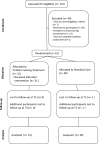Problem-solving skills training for parents of children with chronic pain: a pilot randomized controlled trial
- PMID: 26845525
- PMCID: PMC4935529
- DOI: 10.1097/j.pain.0000000000000508
Problem-solving skills training for parents of children with chronic pain: a pilot randomized controlled trial
Abstract
This pilot randomized controlled trial aimed to determine the feasibility, acceptability, and preliminary efficacy of parental problem-solving skills training (PSST) compared with treatment as usual on improving parental mental health symptoms, physical health and well-being, and parenting behaviors. Effects of parent PSST on child outcomes (pain, emotional, and physical functioning) were also examined. Participants included 61 parents of children aged 10 to 17 years with chronic pain randomized to PSST (n = 31) or treatment as usual (n = 30) groups. Parents receiving PSST participated in 4 to 6 individual sessions of training in problem-solving skills. Outcomes were assessed at pretreatment, immediately after treatment, and at a 3-month follow-up. Feasibility was determined by therapy session attendance, therapist ratings, and parent treatment acceptability ratings. Feasibility of PSST delivery in this population was demonstrated by high compliance with therapy attendance, excellent retention, high therapist ratings of treatment engagement, and high parent ratings of treatment acceptability. PSST was associated with posttreatment improvements in parental depression (d = -0.68), general mental health (d = 0.64), and pain catastrophizing (d = -0.48), as well as in child depression (d = -0.49), child general anxiety (d = -0.56), and child pain-specific anxiety (d = -0.82). Several effects were maintained at the 3-month follow-up. Findings demonstrate that PSST is feasible and acceptable to parents of youths with chronic pain. Treatment outcome analyses show promising but mixed patterns of effects of PSST on parent and child mental health outcomes. Further rigorous trials of PSST are needed to extend these pilot results.
Conflict of interest statement
References
-
- Abidin RR. Parenting Stress Index. Odessa, FL: Psychological Assessment Resources; 1995.
-
- Arnau RC, Meagher MW, Norris MP, Bramson R. Psychometric evaluation of the Beck Depression Inventory-II with primary care medical patients. Health Psychol. 2001;20(2):112–9. - PubMed
-
- Barlow JH, Ellard DR. The psychosocial well-being of children with chronic disease, their parents and siblings: an overview of the research evidence base. Child Care Health Dev. 2006;32(1):19–31. - PubMed
-
- Beck A, Steer R, Brown G. Manual for the Beck Depression Inventory-II. San Antonio, TX: Psychological Corporation; 1996.
-
- Bigras M, LaFreniere PJ, Dumas JE. Discriminant Validity of the Parent and Child Scales of the Parenting Stress Index. Early Education and Development. 1996;7(2):167–178.
Publication types
MeSH terms
Grants and funding
LinkOut - more resources
Full Text Sources
Other Literature Sources
Medical


